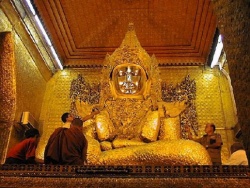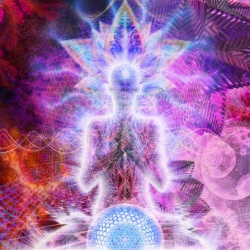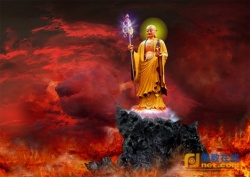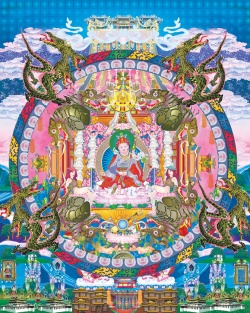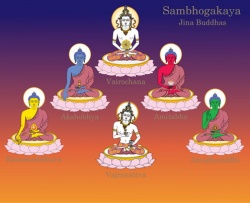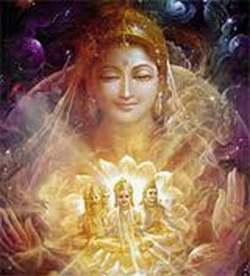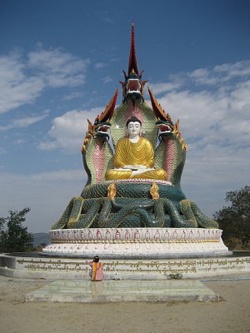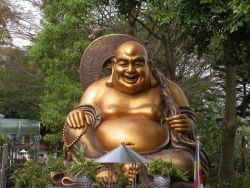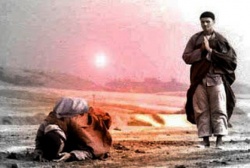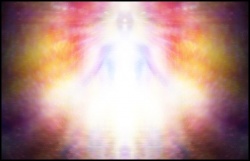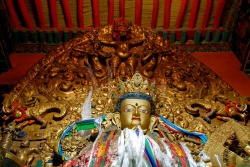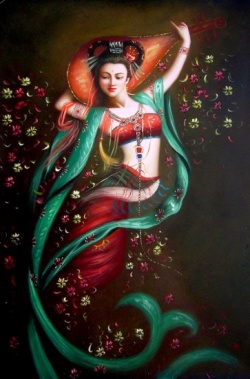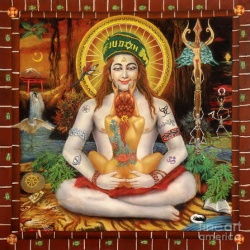Difference between revisions of "The Gospel of Buddha:Chapter 09: The Bodhisatta's Search"
(Created page with "{{DisplayImages|224|25|1555|56|1754|2121|1499|1930|1802|976|636|942|1890|1274|453|1347|1014|53|412|58|663|319}} Alara and Uddaha were renowed as teachers among the Brahmans,<b...") |
|||
| Line 1: | Line 1: | ||
| − | {{DisplayImages|224|25|1555|56|1754|2121|1499|1930|1802|976|636|942|1890|1274|453|1347|1014 | + | {{DisplayImages|224|25|1555|56|1754|2121|1499|1930|1802|976|636|942|1890|1274|453|1347|1014}} |
| − | Alara and Uddaha were renowed as teachers among the Brahmans,<br/> | + | [[Alara]] and Uddaha were renowed as [[teachers]] among the [[Brahmans]],<br/> |
and there was no one in those days who surpassed them<br/> | and there was no one in those days who surpassed them<br/> | ||
| − | in learning and philosophical knowledge. [1]<br/> | + | in {{Wiki|learning}} and [[philosophical]] [[knowledge]]. [1]<br/> |
<br/> | <br/> | ||
| − | The Bodhisatta went to them and sat at their feet.<br/> | + | The [[Bodhisatta]] went to them and sat at their feet.<br/> |
| − | He listened to their doctrines of the atman or self,<br/> | + | He listened to their [[doctrines]] of the [[atman]] or [[self]],<br/> |
| − | which is the ego of the mind and the doer of all doings.<br/> | + | which is the [[ego]] of the [[mind]] and the doer of all doings.<br/> |
| − | He learned their views of the transmigration of souls and the law of karma;<br/> | + | He learned their [[views]] of the [[transmigration]] of [[souls]] and the [[law of karma]];<br/> |
| − | how the souls of bad men had to suffer<br/> | + | how the [[souls]] of bad men had to [[suffer]]<br/> |
| − | by being reborn in men of low caste, in animals, or in hell,<br/> | + | by being [[reborn]] in men of low [[caste]], in [[animals]], or in [[hell]],<br/> |
| − | while those who purified themselves by libations, by sacrifices, and by self-mortification<br/> | + | while those who [[purified]] themselves by libations, by sacrifices, and by [[self-mortification]]<br/> |
| − | would become kings, or Brahmans, or devas,<br/> | + | would become [[kings]], or [[Brahmans]], or [[devas]],<br/> |
| − | so as to rise higher in the grades of existence.<br/> | + | so as to rise higher in the grades of [[existence]].<br/> |
| − | He studied their incantations and offerings<br/> | + | He studied their incantations and [[offerings]]<br/> |
| − | and the methods by which they attained deliverance of the ego<br/> | + | and the methods by which they attained [[deliverance]] of the [[ego]]<br/> |
| − | from material existence in states of ecstacy. [2]<br/> | + | from material [[existence]] in states of ecstacy. [2]<br/> |
<br/> | <br/> | ||
| − | Alara said:<br/> | + | [[Alara]] said:<br/> |
| − | "What is that self<br/> | + | "What is that [[self]]<br/> |
| − | which perceives the actions of the five roots of mind,<br/> | + | which [[perceives]] the [[actions]] of the [[five roots]] of [[mind]],<br/> |
| − | touch, smell, taste, sight and hearing?<br/> | + | {{Wiki|touch}}, {{Wiki|smell}}, {{Wiki|taste}}, [[sight]] and hearing?<br/> |
What is that which is active in the two ways of motion,<br/> | What is that which is active in the two ways of motion,<br/> | ||
in the hands and in the feet?<br/> | in the hands and in the feet?<br/> | ||
| − | The problem of the soul appears in the expressions 'I say,'<br/> | + | The problem of the [[soul]] appears in the expressions 'I say,'<br/> |
| − | 'I know and perceive,'<br/> | + | 'I know and {{Wiki|perceive}},'<br/> |
'I come,' and 'I go'<br/> | 'I come,' and 'I go'<br/> | ||
or 'I will stay here.'<br/> | or 'I will stay here.'<br/> | ||
| − | The soul is not thy body;<br/> | + | The [[soul]] is not thy [[body]];<br/> |
| − | it is not thy eye, not thy ear, not thy nose,<br/> | + | it is not thy [[eye]], not thy {{Wiki|ear}}, not thy {{Wiki|nose}},<br/> |
| − | not thy tongue, nor is it thy mind.<br/> | + | not thy {{Wiki|tongue}}, nor is it thy [[mind]].<br/> |
| − | The I is the one who feels the touch in thy body.<br/> | + | The I is the one who [[feels]] the {{Wiki|touch}} in thy [[body]].<br/> |
| − | The I is the smeller in the nose, the taster in the tongue,<br/> | + | The I is the smeller in the {{Wiki|nose}}, the taster in the {{Wiki|tongue}},<br/> |
| − | the seer in the eye, the hearer in the ear, and the thinker in the mind.<br/> | + | the seer in the [[eye]], the hearer in the {{Wiki|ear}}, and the thinker in the [[mind]].<br/> |
The I moves thy hands and thy feet.<br/> | The I moves thy hands and thy feet.<br/> | ||
| − | The I is thy soul.<br/> | + | The I is thy [[soul]].<br/> |
| − | Doubt in the existence of the soul is irreligious,<br/> | + | [[Doubt]] in the [[existence]] of the [[soul]] is irreligious,<br/> |
| − | and without discerning this truth there is no way of salvation.<br/> | + | and without discerning this [[truth]] there is no way of {{Wiki|salvation}}.<br/> |
| − | Deep speculation will easily involve the mind;<br/> | + | Deep speculation will easily involve the [[mind]];<br/> |
| − | it leads to confusion and unbelief;<br/> | + | it leads to {{Wiki|confusion}} and unbelief;<br/> |
| − | but a purification of the soul leads to the way of escape.<br/> | + | but a [[purification]] of the [[soul]] leads to the way of escape.<br/> |
| − | True deliverance is reached by removing from the croud and leading a hermit's life,<br/> | + | True [[deliverance]] is reached by removing from the croud and leading a hermit's [[life]],<br/> |
| − | depending entirely on alms for food.<br/> | + | depending entirely on [[alms]] for [[food]].<br/> |
| − | Putting away all desire and clearly recognizing the non-existence of matter,<br/> | + | Putting away all [[desire]] and clearly [[recognizing]] the [[non-existence]] of matter,<br/> |
| − | we reach a state of perfect emptiness.<br/> | + | we reach a state of perfect [[emptiness]].<br/> |
| − | Here we find the condition of immaterial life.<br/> | + | Here we find the [[condition]] of {{Wiki|immaterial}} [[life]].<br/> |
As the munja grass when freed from its horny case,<br/> | As the munja grass when freed from its horny case,<br/> | ||
as a sword when drawn from its scabbard,<br/> | as a sword when drawn from its scabbard,<br/> | ||
| − | or as the wild bird escaped from its prison,<br/> | + | or as the wild {{Wiki|bird}} escaped from its {{Wiki|prison}},<br/> |
| − | so the ego, liberating itself from all limitations, finds perfect release.<br/> | + | so the [[ego]], liberating itself from all limitations, finds perfect release.<br/> |
| − | This is true deliverance, but those only who will have deep faith will learn." [3]<br/> | + | This is true [[deliverance]], but those only who will have deep [[faith]] will learn." [3]<br/> |
<br/> | <br/> | ||
| − | The Bodhisatta found no satisfaction in these teachings.<br/> | + | The [[Bodhisatta]] found no [[satisfaction]] in these teachings.<br/> |
| − | He replied: "People are in bondage,<br/> | + | He replied: "[[People]] are in bondage,<br/> |
| − | because they have not yet removed the idea of the ego. [4]<br/> | + | because they have not yet removed the [[idea]] of the [[ego]]. [4]<br/> |
<br/> | <br/> | ||
| − | "The thing and its quality are different in our thought, but not in reality.<br/> | + | "The thing and its quality are different in our [[thought]], but not in [[reality]].<br/> |
| − | Heat is different from fire in our thought,<br/> | + | Heat is different from [[fire]] in our [[thought]],<br/> |
| − | but you cannot remove heat from fire in reality.<br/> | + | but you cannot remove heat from [[fire]] in [[reality]].<br/> |
You say that you can remove the qualities and leave the thing,<br/> | You say that you can remove the qualities and leave the thing,<br/> | ||
| − | but if you think your theory to the end,<br/> | + | but if you think your {{Wiki|theory}} to the end,<br/> |
you will find that this is not so. [5]<br/> | you will find that this is not so. [5]<br/> | ||
<br/> | <br/> | ||
| − | "Is not man an organism of many aggregates?<br/> | + | "Is not man an {{Wiki|organism}} of many [[aggregates]]?<br/> |
| − | Are we not composed of various attributes?<br/> | + | Are we not composed of various [[attributes]]?<br/> |
| − | Man consists of the material form, of sensation,<br/> | + | Man consists of the [[material form]], of [[sensation]],<br/> |
| − | of thought, of dispositions, and, lastly, of understanding.<br/> | + | of [[thought]], of dispositions, and, lastly, of [[understanding]].<br/> |
| − | That which men call the ego when they say 'I am'<br/> | + | That which men call the [[ego]] when they say 'I am'<br/> |
| − | is not an entity behind the attributes;<br/> | + | is not an [[entity]] behind the [[attributes]];<br/> |
it originates by their co-operation.<br/> | it originates by their co-operation.<br/> | ||
| − | There is mind; there is sensation and thought,<br/> | + | There is [[mind]]; there is [[sensation]] and [[thought]],<br/> |
| − | and there is truth;<br/> | + | and there is [[truth]];<br/> |
| − | and truth is mind when it walks in the path of righteousness.<br/> | + | and [[truth]] is [[mind]] when it walks in the [[path of righteousness]].<br/> |
| − | But there is no separate ego-soul outside of behind the thought of man.<br/> | + | But there is no separate ego-soul outside of behind the [[thought]] of man.<br/> |
| − | He who believes that the ego is a distinct being has no correct conception of things.<br/> | + | He who believes that the [[ego]] is a {{Wiki|distinct}} being has no correct {{Wiki|conception}} of things.<br/> |
| − | The very search for the atman is wrong;<br/> | + | The very search for the [[atman]] is wrong;<br/> |
| − | it is a wrong start and it will lead you in a false direction. [6]<br/> | + | it is a wrong start and it will lead you in a false [[direction]]. [6]<br/> |
<br/> | <br/> | ||
| − | "How much confusion of thought comes from our interest in self,<br/> | + | "How much {{Wiki|confusion}} of [[thought]] comes from our [[interest]] in [[self]],<br/> |
| − | and from our vanity when thinking 'I am so great,'<br/> | + | and from our vanity when [[thinking]] 'I am so great,'<br/> |
| − | or 'I have done this wonderful deed?'<br/> | + | or 'I have done this wonderful [[deed]]?'<br/> |
| − | The thought of thine ego stands between thy rational nature and truth;<br/> | + | The [[thought]] of thine [[ego]] stands between thy [[rational]] [[nature]] and [[truth]];<br/> |
banish it, and then wilt thou see things as they are.<br/> | banish it, and then wilt thou see things as they are.<br/> | ||
| − | He who thinks correctly will rid himself of ignorance and acquire wisdom.<br/> | + | He who [[thinks]] correctly will rid himself of [[ignorance]] and acquire [[wisdom]].<br/> |
| − | The ideas 'I am' and 'I shall be' or 'I shall not be'<br/> | + | The [[ideas]] 'I am' and 'I shall be' or 'I shall not be'<br/> |
do not occur to a clear thinker. [7]<br/> | do not occur to a clear thinker. [7]<br/> | ||
<br/> | <br/> | ||
| − | "Moreover, if our ego remains, how can we attain true deliverance?<br/> | + | "Moreover, if our [[ego]] remains, how can we attain true [[deliverance]]?<br/> |
| − | If the ego is to be reborn in any of the three worlds,<br/> | + | If the [[ego]] is to be [[reborn]] in any of the [[three worlds]],<br/> |
| − | be it in hell, upon earth, or be it in heaven,<br/> | + | be it in [[hell]], upon [[earth]], or be it in [[heaven]],<br/> |
| − | we shall meet again and again the same inevitable doom of sorrow.<br/> | + | we shall meet again and again the same inevitable doom of [[sorrow]].<br/> |
| − | We shall remain chained to the wheel of individuality<br/> | + | We shall remain chained to the [[wheel]] of [[individuality]]<br/> |
| − | and shall be implicated in egotism and wrong. [8]<br/> | + | and shall be implicated in [[egotism]] and wrong. [8]<br/> |
<br/> | <br/> | ||
| − | "All combinations is subject to separation,<br/> | + | "All combinations is [[subject]] to separation,<br/> |
| − | and we cannot escape birth, disease, old age, and death.<br/> | + | and we cannot escape [[birth]], {{Wiki|disease}}, [[old age]], and [[death]].<br/> |
Is this a final escape?" [9]<br/> | Is this a final escape?" [9]<br/> | ||
<br/> | <br/> | ||
| − | Said Uddaka: "Consider the unity of things.<br/> | + | Said [[Uddaka]]: "Consider the unity of things.<br/> |
| − | Things are not their parts, yet they exist.<br/> | + | Things are not their parts, yet they [[exist]].<br/> |
| − | The members and organs of thy body are not thine ego,<br/> | + | The members and organs of thy [[body]] are not thine [[ego]],<br/> |
| − | but thine ego possesses all these parts.<br/> | + | but thine [[ego]] possesses all these parts.<br/> |
| − | What, for instance, is the Ganges?<br/> | + | What, for instance, is the [[Ganges]]?<br/> |
| − | Is the sand the Ganges?<br/> | + | Is the sand the [[Ganges]]?<br/> |
| − | Is the water the Ganges?<br/> | + | Is the [[water]] the [[Ganges]]?<br/> |
| − | Is the hither bank the Ganges?<br/> | + | Is the hither bank the [[Ganges]]?<br/> |
| − | Is the farther bank the Ganges?<br/> | + | Is the farther bank the [[Ganges]]?<br/> |
| − | The Ganges is a mighty river and it possesses all these several qualities.<br/> | + | The [[Ganges]] is a mighty [[river]] and it possesses all these several qualities.<br/> |
| − | Exactly so is our ego." [10]<br/> | + | Exactly so is our [[ego]]." [10]<br/> |
<br/> | <br/> | ||
| − | But the Bodhisatta replied: "Not so, sir!<br/> | + | But the [[Bodhisatta]] replied: "Not so, sir!<br/> |
| − | If we except the water, the sand, the hither bank and the farther bank,<br/> | + | If we except the [[water]], the sand, the hither bank and the farther bank,<br/> |
| − | where can we find any Ganges?<br/> | + | where can we find any [[Ganges]]?<br/> |
| − | In the same way I observe the activities of man in their harmonious union,<br/> | + | In the same way I observe the [[activities]] of man in their harmonious union,<br/> |
| − | but there is no ground for an ego outside it parts." [11]<br/> | + | but there is no ground for an [[ego]] outside it parts." [11]<br/> |
<br/> | <br/> | ||
| − | The Brahman sage, however, insisted on the existence of the ego, saying:<br/> | + | The [[Brahman]] [[Wikipedia:Sage (sophos|sage]], however, insisted on the [[existence]] of the [[ego]], saying:<br/> |
| − | "The ego is the doer of our deeds.<br/> | + | "The [[ego]] is the doer of our [[deeds]].<br/> |
| − | How can there be karma without a self as its performer?<br/> | + | How can there be [[karma]] without a [[self]] as its performer?<br/> |
| − | Do we not see around us the effects of karma?<br/> | + | Do we not see around us the effects of [[karma]]?<br/> |
| − | What makes men different in character, station, possessions, and fate?<br/> | + | What makes men different in [[character]], station, possessions, and [[fate]]?<br/> |
| − | It is their karma, and karma includes merit and demerit.<br/> | + | It is their [[karma]], and [[karma]] includes [[merit]] and demerit.<br/> |
| − | The transmigration of the soul is subject to its karma.<br/> | + | The [[transmigration]] of the [[soul]] is [[subject]] to its [[karma]].<br/> |
| − | We inherit from former existences the evil effects of our evil deeds<br/> | + | We inherit from former [[existences]] the [[evil]] effects of our [[evil]] [[deeds]]<br/> |
| − | and the good effects of our good deeds.<br/> | + | and the good effects of our [[good deeds]].<br/> |
If that were not so, how could we be different?" [12]<br/> | If that were not so, how could we be different?" [12]<br/> | ||
<br/> | <br/> | ||
| − | The Tathagata meditated deeply on the problems of transmigration and karma,<br/> | + | The [[Tathagata]] [[meditated]] deeply on the problems of [[transmigration]] and [[karma]],<br/> |
| − | and found the truth that lies in them. [13]<br/> | + | and found the [[truth]] that lies in them. [13]<br/> |
<br/> | <br/> | ||
| − | "The doctrine of karma," he said, "is undeniable,<br/> | + | "The [[doctrine]] of [[karma]]," he said, "is undeniable,<br/> |
| − | but thy theory of the ego has no foundation. [14]<br/> | + | but thy {{Wiki|theory}} of the [[ego]] has no foundation. [14]<br/> |
<br/> | <br/> | ||
| − | "Like everything else in nature,<br/> | + | "Like everything else in [[nature]],<br/> |
| − | the life of man is subject to the law of cause and effect.<br/> | + | the [[life]] of man is [[subject]] to the [[law of cause and effect]].<br/> |
| − | The present reaps what the past has sown,<br/> | + | The {{Wiki|present}} reaps what the {{Wiki|past}} has sown,<br/> |
| − | and the future is the product of the present.<br/> | + | and the {{Wiki|future}} is the product of the {{Wiki|present}}.<br/> |
| − | But there is no evidence of the existence of an immutable ego-being,<br/> | + | But there is no {{Wiki|evidence}} of the [[existence]] of an immutable ego-being,<br/> |
| − | of a self which remains the same and migrates from body to body.<br/> | + | of a [[self]] which remains the same and migrates from [[body]] to [[body]].<br/> |
| − | There is rebirth but no transmigration. [15]<br/> | + | There is [[rebirth]] but no [[transmigration]]. [15]<br/> |
<br/> | <br/> | ||
| − | "Is not this individuality of mine a combination, material as well as mental?<br/> | + | "Is not this [[individuality]] of mine a combination, material as well as [[mental]]?<br/> |
| − | Is it not made up of qualities that sprang into being by a gradual evolution?<br/> | + | Is it not made up of qualities that sprang into being by a [[gradual]] [[evolution]]?<br/> |
| − | The five roots of sense-perception in this organism<br/> | + | The [[five roots]] of sense-perception in this {{Wiki|organism}}<br/> |
| − | have come from ancestors who performed these functions.<br/> | + | have come from {{Wiki|ancestors}} who performed these functions.<br/> |
| − | The ideas which I think, came to me partly from others who thought them,<br/> | + | The [[ideas]] which I think, came to me partly from others who [[thought]] them,<br/> |
| − | and partly they rise from combinations of the ideas in my mind.<br/> | + | and partly they rise from combinations of the [[ideas]] in my [[mind]].<br/> |
| − | Those who have used the same sense-organs, and have thought the same ideas<br/> | + | Those who have used the same [[sense-organs]], and have [[thought]] the same [[ideas]]<br/> |
| − | before I was composed into this individuality of mine are my previous existences;<br/> | + | before I was composed into this [[individuality]] of mine are my previous [[existences]];<br/> |
| − | they are my ancestors as much as the I of yesterday is the father of the I of to-day,<br/> | + | they are my {{Wiki|ancestors}} as much as the I of yesterday is the father of the I of to-day,<br/> |
| − | and the karma of my past deeds conditions the fate of my present existence. [16]<br/> | + | and the [[karma]] of my {{Wiki|past}} [[deeds]] [[conditions]] the [[fate]] of my {{Wiki|present}} [[existence]]. [16]<br/> |
<br/> | <br/> | ||
| − | "Supposing that were an atman that performs the actions of the senses,<br/> | + | "Supposing that were an [[atman]] that performs the [[actions]] of the [[senses]],<br/> |
| − | then if the door of sight were torn down and the eye plucked out,<br/> | + | then if the door of [[sight]] were torn down and the [[eye]] plucked out,<br/> |
| − | that atman would be able to peep through the larger aperture<br/> | + | that [[atman]] would be able to peep through the larger aperture<br/> |
| − | and see the forms of its surroundings better and more clearly than before.<br/> | + | and see the [[forms]] of its surroundings better and more clearly than before.<br/> |
| − | it would be able to hear sounds better if the ears were torn away;<br/> | + | it would be able to hear {{Wiki|sounds}} better if the {{Wiki|ears}} were torn away;<br/> |
| − | smell better if the nose were cut off;<br/> | + | {{Wiki|smell}} better if the {{Wiki|nose}} were cut off;<br/> |
| − | taste better if the tongue were pulled out;<br/> | + | {{Wiki|taste}} better if the {{Wiki|tongue}} were pulled out;<br/> |
| − | and feel better if the body were destroyed. [17]<br/> | + | and [[feel]] better if the [[body]] were destroyed. [17]<br/> |
<br/> | <br/> | ||
| − | "I observe the preservation and transmission of character;<br/> | + | "I observe the preservation and [[transmission]] of [[character]];<br/> |
| − | I perceive the truth of karma,<br/> | + | I {{Wiki|perceive}} the [[truth]] of [[karma]],<br/> |
| − | but see no atman whom your doctrine makes the doer of your deeds.<br/> | + | but see no [[atman]] whom your [[doctrine]] makes the doer of your [[deeds]].<br/> |
| − | There is rebirth without the transmigration of a self.<br/> | + | There is [[rebirth]] without the [[transmigration]] of a [[self]].<br/> |
| − | For this atman, this self, this ego in the 'I say' and in the 'I will' is an illusion.<br/> | + | For this [[atman]], this [[self]], this [[ego]] in the 'I say' and in the 'I will' is an [[illusion]].<br/> |
| − | If this self were a reality, how could there be an escape from selfhood?<br/> | + | If this [[self]] were a [[reality]], how could there be an escape from [[selfhood]]?<br/> |
| − | The terror of hell would be infinite, and no release could be granted.<br/> | + | The terror of [[hell]] would be [[infinite]], and no release could be granted.<br/> |
| − | The evils of existence would not be due to our ignorance and wrong-doing,<br/> | + | The [[evils]] of [[existence]] would not be due to our [[ignorance]] and wrong-doing,<br/> |
| − | but would constitute the very nature of our being." [18]<br/> | + | but would constitute the very [[nature]] of our being." [18]<br/> |
<br/> | <br/> | ||
| − | And the Bodhisatta went to the priests officiating in the temples.<br/> | + | And the [[Bodhisatta]] went to the {{Wiki|priests}} officiating in the [[temples]].<br/> |
| − | But the gentle mind of the Sakyamuni was offended<br/> | + | But the gentle [[mind]] of the [[Sakyamuni]] was offended<br/> |
| − | at the unnecessary cruelty performed on the altars of the gods.<br/> | + | at the unnecessary [[cruelty]] performed on the [[altars]] of the [[gods]].<br/> |
He said: [19]<br/> | He said: [19]<br/> | ||
<br/> | <br/> | ||
| − | "Ignorance only can make these men prepare festivals<br/> | + | "[[Ignorance]] only can make these men prepare festivals<br/> |
and hold vast meetings for sacrifices.<br/> | and hold vast meetings for sacrifices.<br/> | ||
| − | Far better to revere the truth than try to appease the gods by shedding blood. [20]<br/> | + | Far better to revere the [[truth]] than try to appease the [[gods]] by shedding {{Wiki|blood}}. [20]<br/> |
<br/> | <br/> | ||
| − | "What love can a man possess<br/> | + | "What [[love]] can a man possess<br/> |
| − | who believes that the destruction of life will atone for evil deeds?<br/> | + | who believes that the destruction of [[life]] will atone for [[evil]] [[deeds]]?<br/> |
Can a new wrong expiate old wrongs?<br/> | Can a new wrong expiate old wrongs?<br/> | ||
| − | And can the slaughter of an innocent victim blot out the evil deeds of mankind?<br/> | + | And can the slaughter of an innocent victim blot out the [[evil]] [[deeds]] of mankind?<br/> |
| − | This is practising religion by the neglect of moral conduct. [21]<br/> | + | This is practising [[religion]] by the neglect of [[moral conduct]]. [21]<br/> |
<br/> | <br/> | ||
| − | "Purify your hearts and cease to kill,<br/> | + | "{{Wiki|Purify}} your hearts and cease to kill,<br/> |
| − | that is true religion. [22]<br/> | + | that is true [[religion]]. [22]<br/> |
<br/> | <br/> | ||
| − | "Rituals have no efficacy;<br/> | + | "[[Rituals]] have no efficacy;<br/> |
| − | prayers are vain repetitions;<br/> | + | [[prayers]] are vain repetitions;<br/> |
and incantations have no saving power.<br/> | and incantations have no saving power.<br/> | ||
| − | But to abandon covetousness and lust,<br/> | + | But to abandon covetousness and [[lust]],<br/> |
| − | to become free from evil passions,<br/> | + | to become free from [[evil]] [[passions]],<br/> |
| − | and to give up all hatred and ill-will,<br/> | + | and to give up all [[hatred]] and [[ill-will]],<br/> |
| − | that is the right sacrifice and the true worship." [23]<br/> | + | that is the right {{Wiki|sacrifice}} and the true {{Wiki|worship}}." [23]<br/> |
{{The Gospel of Buddha}} | {{The Gospel of Buddha}} | ||
Latest revision as of 18:27, 31 December 2013
Alara and Uddaha were renowed as teachers among the Brahmans,
and there was no one in those days who surpassed them
in learning and philosophical knowledge. [1]
The Bodhisatta went to them and sat at their feet.
He listened to their doctrines of the atman or self,
which is the ego of the mind and the doer of all doings.
He learned their views of the transmigration of souls and the law of karma;
how the souls of bad men had to suffer
by being reborn in men of low caste, in animals, or in hell,
while those who purified themselves by libations, by sacrifices, and by self-mortification
would become kings, or Brahmans, or devas,
so as to rise higher in the grades of existence.
He studied their incantations and offerings
and the methods by which they attained deliverance of the ego
from material existence in states of ecstacy. [2]
Alara said:
"What is that self
which perceives the actions of the five roots of mind,
touch, smell, taste, sight and hearing?
What is that which is active in the two ways of motion,
in the hands and in the feet?
The problem of the soul appears in the expressions 'I say,'
'I know and perceive,'
'I come,' and 'I go'
or 'I will stay here.'
The soul is not thy body;
it is not thy eye, not thy ear, not thy nose,
not thy tongue, nor is it thy mind.
The I is the one who feels the touch in thy body.
The I is the smeller in the nose, the taster in the tongue,
the seer in the eye, the hearer in the ear, and the thinker in the mind.
The I moves thy hands and thy feet.
The I is thy soul.
Doubt in the existence of the soul is irreligious,
and without discerning this truth there is no way of salvation.
Deep speculation will easily involve the mind;
it leads to confusion and unbelief;
but a purification of the soul leads to the way of escape.
True deliverance is reached by removing from the croud and leading a hermit's life,
depending entirely on alms for food.
Putting away all desire and clearly recognizing the non-existence of matter,
we reach a state of perfect emptiness.
Here we find the condition of immaterial life.
As the munja grass when freed from its horny case,
as a sword when drawn from its scabbard,
or as the wild bird escaped from its prison,
so the ego, liberating itself from all limitations, finds perfect release.
This is true deliverance, but those only who will have deep faith will learn." [3]
The Bodhisatta found no satisfaction in these teachings.
He replied: "People are in bondage,
because they have not yet removed the idea of the ego. [4]
"The thing and its quality are different in our thought, but not in reality.
Heat is different from fire in our thought,
but you cannot remove heat from fire in reality.
You say that you can remove the qualities and leave the thing,
but if you think your theory to the end,
you will find that this is not so. [5]
"Is not man an organism of many aggregates?
Are we not composed of various attributes?
Man consists of the material form, of sensation,
of thought, of dispositions, and, lastly, of understanding.
That which men call the ego when they say 'I am'
is not an entity behind the attributes;
it originates by their co-operation.
There is mind; there is sensation and thought,
and there is truth;
and truth is mind when it walks in the path of righteousness.
But there is no separate ego-soul outside of behind the thought of man.
He who believes that the ego is a distinct being has no correct conception of things.
The very search for the atman is wrong;
it is a wrong start and it will lead you in a false direction. [6]
"How much confusion of thought comes from our interest in self,
and from our vanity when thinking 'I am so great,'
or 'I have done this wonderful deed?'
The thought of thine ego stands between thy rational nature and truth;
banish it, and then wilt thou see things as they are.
He who thinks correctly will rid himself of ignorance and acquire wisdom.
The ideas 'I am' and 'I shall be' or 'I shall not be'
do not occur to a clear thinker. [7]
"Moreover, if our ego remains, how can we attain true deliverance?
If the ego is to be reborn in any of the three worlds,
be it in hell, upon earth, or be it in heaven,
we shall meet again and again the same inevitable doom of sorrow.
We shall remain chained to the wheel of individuality
and shall be implicated in egotism and wrong. [8]
"All combinations is subject to separation,
and we cannot escape birth, disease, old age, and death.
Is this a final escape?" [9]
Said Uddaka: "Consider the unity of things.
Things are not their parts, yet they exist.
The members and organs of thy body are not thine ego,
but thine ego possesses all these parts.
What, for instance, is the Ganges?
Is the sand the Ganges?
Is the water the Ganges?
Is the hither bank the Ganges?
Is the farther bank the Ganges?
The Ganges is a mighty river and it possesses all these several qualities.
Exactly so is our ego." [10]
But the Bodhisatta replied: "Not so, sir!
If we except the water, the sand, the hither bank and the farther bank,
where can we find any Ganges?
In the same way I observe the activities of man in their harmonious union,
but there is no ground for an ego outside it parts." [11]
The Brahman sage, however, insisted on the existence of the ego, saying:
"The ego is the doer of our deeds.
How can there be karma without a self as its performer?
Do we not see around us the effects of karma?
What makes men different in character, station, possessions, and fate?
It is their karma, and karma includes merit and demerit.
The transmigration of the soul is subject to its karma.
We inherit from former existences the evil effects of our evil deeds
and the good effects of our good deeds.
If that were not so, how could we be different?" [12]
The Tathagata meditated deeply on the problems of transmigration and karma,
and found the truth that lies in them. [13]
"The doctrine of karma," he said, "is undeniable,
but thy theory of the ego has no foundation. [14]
"Like everything else in nature,
the life of man is subject to the law of cause and effect.
The present reaps what the past has sown,
and the future is the product of the present.
But there is no evidence of the existence of an immutable ego-being,
of a self which remains the same and migrates from body to body.
There is rebirth but no transmigration. [15]
"Is not this individuality of mine a combination, material as well as mental?
Is it not made up of qualities that sprang into being by a gradual evolution?
The five roots of sense-perception in this organism
have come from ancestors who performed these functions.
The ideas which I think, came to me partly from others who thought them,
and partly they rise from combinations of the ideas in my mind.
Those who have used the same sense-organs, and have thought the same ideas
before I was composed into this individuality of mine are my previous existences;
they are my ancestors as much as the I of yesterday is the father of the I of to-day,
and the karma of my past deeds conditions the fate of my present existence. [16]
"Supposing that were an atman that performs the actions of the senses,
then if the door of sight were torn down and the eye plucked out,
that atman would be able to peep through the larger aperture
and see the forms of its surroundings better and more clearly than before.
it would be able to hear sounds better if the ears were torn away;
smell better if the nose were cut off;
taste better if the tongue were pulled out;
and feel better if the body were destroyed. [17]
"I observe the preservation and transmission of character;
I perceive the truth of karma,
but see no atman whom your doctrine makes the doer of your deeds.
There is rebirth without the transmigration of a self.
For this atman, this self, this ego in the 'I say' and in the 'I will' is an illusion.
If this self were a reality, how could there be an escape from selfhood?
The terror of hell would be infinite, and no release could be granted.
The evils of existence would not be due to our ignorance and wrong-doing,
but would constitute the very nature of our being." [18]
And the Bodhisatta went to the priests officiating in the temples.
But the gentle mind of the Sakyamuni was offended
at the unnecessary cruelty performed on the altars of the gods.
He said: [19]
"Ignorance only can make these men prepare festivals
and hold vast meetings for sacrifices.
Far better to revere the truth than try to appease the gods by shedding blood. [20]
"What love can a man possess
who believes that the destruction of life will atone for evil deeds?
Can a new wrong expiate old wrongs?
And can the slaughter of an innocent victim blot out the evil deeds of mankind?
This is practising religion by the neglect of moral conduct. [21]
"Purify your hearts and cease to kill,
that is true religion. [22]
"Rituals have no efficacy;
prayers are vain repetitions;
and incantations have no saving power.
But to abandon covetousness and lust,
to become free from evil passions,
and to give up all hatred and ill-will,
that is the right sacrifice and the true worship." [23]
Continue Reading
- The Gospel of Buddha: Preface
- The Gospel of Buddha:Chapter 01: Rejoice
- The Gospel of Buddha:Chapter 02: Samsara and Nirvana
- The Gospel of Buddha:Chapter 03: Truth the Saviour
- The Gospel of Buddha:Chapter 04: The Bodhisatta's Birth
- The Gospel of Buddha:Chapter 05: The Ties of Life
- The Gospel of Buddha:Chapter 06: The Three Woes
- The Gospel of Buddha:Chapter 07: The Bodhisatta's Renunciation
- The Gospel of Buddha:Chapter 08: King Bimbisara
- The Gospel of Buddha:Chapter 09: The Bodhisatta's Search
- The Gospel of Buddha:Chapter 10: Uruvela, the Place of Mortification
- The Gospel of Buddha:Chapter 11: Mara, the Evil One
- The Gospel of Buddha:Chapter 12: Enlightenment
- The Gospel of Buddha:Chapter 13: The First Converts
- The Gospel of Buddha:Chapter 14: Brahma's Request
- The Gospel of Buddha:Chapter 15: Upaka
- The Gospel of Buddha:Chapter 16: The Sermon at Benares
- The Gospel of Buddha:Chapter 17: The Sangha
- The Gospel of Buddha:Chapter 18: Yasa, the Youth of Benares
- The Gospel of Buddha:Chapter 19: Kassapa
- The Gospel of Buddha:Chapter 20: The Sermon at Rajagaha
- The Gospel of Buddha:Chapter 21: The King's Gift
- The Gospel of Buddha:Chapter 22: Sariputta and Moggallana
- The Gospel of Buddha:Chapter 23: Anathapindika
- The Gospel of Buddha:Chapter 24: The Sermon on Charity
- The Gospel of Buddha:Chapter 25: Jetavana
- The Gospel of Buddha:Chapter 26: The Three Characteristics and the Uncreate
- The Gospel of Buddha:Chapter 27: The Buddha's Father
- The Gospel of Buddha:Chapter 28: Yasodhara
- The Gospel of Buddha:Chapter 29: Rahula
- The Gospel of Buddha:Chapter 30: Jivaka, the Physician
- The Gospel of Buddha:Chapter 31: The Buddha's Parents Attain Nirvana
- The Gospel of Buddha:Chapter 32: Women Admitted to the Sangha
- The Gospel of Buddha:Chapter 33: The Bhikkhus' Conduct Toward Women
- The Gospel of Buddha:Chapter 34: Visakha
- The Gospel of Buddha:Chapter 35: The Uposatha and Patimokkha
- The Gospel of Buddha:Chapter 36: The Schism
- The Gospel of Buddha:Chapter 37: The Re-establishment of Concord
- The Gospel of Buddha:Chapter 38: The Bhikkhus Rebuked
- The Gospel of Buddha:Chapter 39: Devadatta
- The Gospel of Buddha:Chapter 40: Name and Form
- The Gospel of Buddha:Chapter 41: The Goal
- The Gospel of Buddha:Chapter 42: Miracles Forbidden
- The Gospel of Buddha:Chapter 43: The Vanity of Worldliness
- The Gospel of Buddha:Chapter 44: Secrecy and Publicity
- The Gospel of Buddha:Chapter 45: The Annihilation of Suffering
- The Gospel of Buddha:Chapter 46: Avoiding the Ten Evils
- The Gospel of Buddha:Chapter 47: The Preacher's Mission
- The Gospel of Buddha:Chapter 48: The Dhammapada
- The Gospel of Buddha:Chapter 49: The Two Brahmans
- The Gospel of Buddha:Chapter 50: Guard the Six Quarters
- The Gospel of Buddha:Chapter 51: Simha's Question Concerning Annihilation
- The Gospel of Buddha:Chapter 52: All Existence is Spiritual
- The Gospel of Buddha:Chapter 53: Identity and Non-Identity
- The Gospel of Buddha:Chapter 54: The Buddha Omnipresent
- The Gospel of Buddha:Chapter 55: One Essence, One Law, One Aim
- The Gospel of Buddha:Chapter 56: The Lesson Given to Rahula
- The Gospel of Buddha:Chapter 57: The Sermon on Abuse
- The Gospel of Buddha:Chapter 58: The Buddha Replies to the Deva
- The Gospel of Buddha:Chapter 59: Words of Instruction
- The Gospel of Buddha:Chapter 60: Amitabha
- The Gospel of Buddha:Chapter 61: The Teacher Unknown
- The Gospel of Buddha:Chapter 62: Parables
- The Gospel of Buddha:Chapter 63: The Widow's Two Mites and the Parable of the Three Merchants
- The Gospel of Buddha:Chapter 64: The Man Born Blind
- The Gospel of Buddha:Chapter 65: The Lost Son
- The Gospel of Buddha:Chapter 66: The Giddy Fish
- The Gospel of Buddha:Chapter 67: The Cruel Crane Outwitted
- The Gospel of Buddha:Chapter 68: Four Kinds of Merit
- The Gospel of Buddha:Chapter 69: The Light of the World
- The Gospel of Buddha:Chapter 70: Luxurious Living
- The Gospel of Buddha:Chapter 71: The Communication of Bliss
- The Gospel of Buddha:Chapter 72: The Listless Fool
- The Gospel of Buddha:Chapter 73: Rescue in the Desert
- The Gospel of Buddha:Chapter 74: The Sower
- The Gospel of Buddha:Chapter 75: The Outcast
- The Gospel of Buddha:Chapter 76: The Woman at the Well
- The Gospel of Buddha:Chapter 77: The Peacemaker
- The Gospel of Buddha:Chapter 78: The Hungry Dog
- The Gospel of Buddha:Chapter 79: The Despot
- The Gospel of Buddha:Chapter 80: Vasavadatta
- The Gospel of Buddha:Chapter 81: The Marriage-Feast in Jambunada
- The Gospel of Buddha:Chapter 82: A Party in Search of a Thief
- The Gospel of Buddha:Chapter 83: In the Realm of Yamaraja
- The Gospel of Buddha:Chapter 84: The Mustard Seed
- The Gospel of Buddha:Chapter 85: Following the Master Over the Stream
- The Gospel of Buddha:Chapter 86: The Sick Bhikkhu
- The Gospel of Buddha:Chapter 87: The Patient Elephant
- The Gospel of Buddha:Chapter 88: The Conditions of Welfare
- The Gospel of Buddha:Chapter 89: Sariputta's Faith
- The Gospel of Buddha:Chapter 90: Pataliputta
- The Gospel of Buddha:Chapter 91: The Mirror of Truth
- The Gospel of Buddha:Chapter 92: Ambapali
- The Gospel of Buddha:Chapter 93: The Buddha's Farewell Address
- The Gospel of Buddha:Chapter 94: The Buddha Announces His Death
- The Gospel of Buddha:Chapter 95: Chunda, the Smith
- The Gospel of Buddha:Chapter 96: Metteyya
- The Gospel of Buddha:Chapter 97: The Buddha's Final Entering into Nirvana
- The Gospel of Buddha:Chapter 98: The Three Personalities of the Buddha
- The Gospel of Buddha:Chapter 99: The Purpose of Being
- The Gospel of Buddha:Chapter 100: The Praise of All the Buddhas
